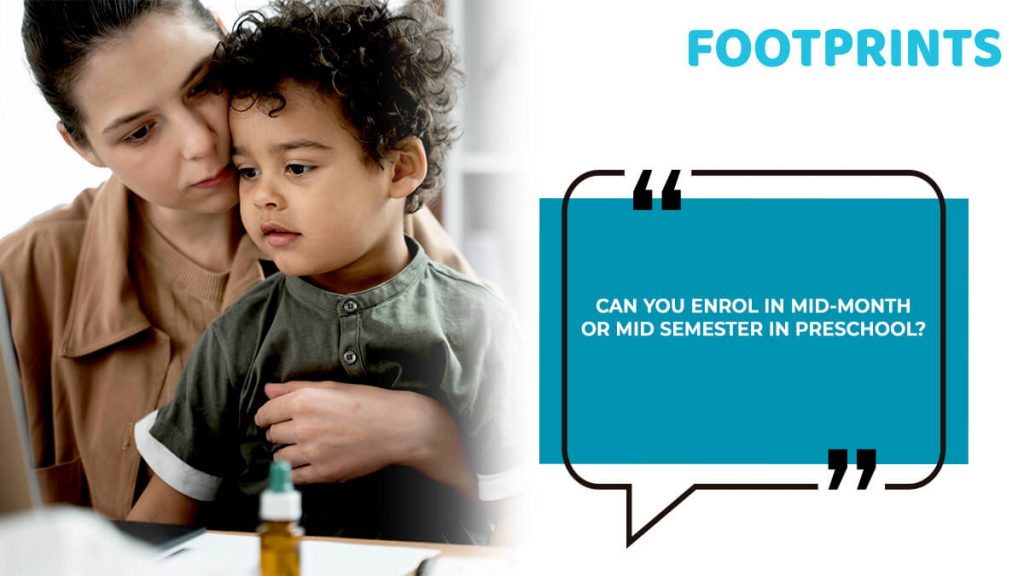

So, your child is turning three at a time when most preschools have already started their semester. Does that mean you have to wait a full year before enrolling your child in preschool? Not necessarily. While preschools may have different rules, progressive ones typically consider mid-semester enrollments.
As a parent, you should typically consider mid-semester enrollments when:
- Your child falls within the age bracket mid-semester.
- Your child is learning concepts at home, but you believe they will benefit from the socialization that preschool offers.
- You want your child to experience holistic learning, acquire essential life skills, and overcome separation anxiety.
The question that may be on your mind is whether your child would have missed out on too much already. While children would have spent an enriching half-semester engaging in fun events and enhancing their language skills, motor skills, cognitive abilities, and more, it’s essential to recognize that a preschool calendar is packed with diverse activities. There will be plenty for the child to catch up on.
It’s crucial to remember that besides pre-literacy skills, progressive preschools focus on providing a wide range of age-appropriate life skills. Scientifically designed curriculums like the High Scope Curriculum emphasize active participatory learning, considering the child’s choices while providing adult guidance. Such a system greatly engages and encourages children while addressing all aspects of development. The primary focus is on offering age-appropriate skills rather than treating teaching and learning as a race.
Given that social and emotional development, cognitive growth, physical development, and more are continuous processes that require attention, children can benefit even if they join mid-semester.
All, while most preschools or pre-nursery classes usually have age criteria, age alone should not be the only factor you consider when enrolling your child in preschool. Chronological age is just one criterion. The start of preschool, as a developmental milestone, is influenced by factors beyond chronological age.
Some other areas to consider include:
Can the child follow directions?
While preschools contribute to a child’s cognitive development, it may be beneficial to enroll your child when they can follow simple directions, even if it means mid-semester enrollment. To ensure they can follow directions, you can engage them in age-appropriate tasks at home. This will also instill in them a sense of confidence and responsibility, which are important indicators of future success.
Is the child independent?
Once again, while preschool provides an excellent environment for a child to develop independence, it’s beneficial to ensure that the child can undertake age-appropriate tasks independently. One way to nurture independence is by offering them choices. For example, instead of insisting on a specific breakfast and potentially entering a power struggle, it helps to offer them a choice between two healthy breakfast options. These seemingly small decisions will benefit them in the long run as they develop a habit of making independent choices.
Can the child’s speech be understood?
A child’s language skills, vocabulary, and more benefit from the scientific preschool curriculum, as well as the socialization the child experiences at preschool. However, it’s essential that people can understand the child’s speech, even though it doesn’t have to be perfect. Sometimes, the transition to preschool may also depend on this factor.
If you feel the child isn’t quite ready for traditional preschool, you may consider whether they would benefit from a toddler program. Typically, a well-organized toddler program provides a child-friendly space, age-appropriate activities, and materials that aid in exploration. These inclusive, engaging, and interactive learning environments adapt to the child’s specific learning and developmental needs.
To Sum Up
The answer to whether a child can be enrolled in preschool mid-semester is yes. However, to do this, you should view preschool education as a consistent and holistic learning journey rather than merely focusing on a traditional academic syllabus, which might have been partially missed. If you believe your child isn’t quite ready for preschool at the standard chronological age, there’s no need to worry. It’s crucial not to compare your child to others, as each child has their unique journey. And, of course, if you notice any signs of developmental delay, it’s essential to consult a medical professional promptly.
When choosing a preschool, conduct thorough research to select one that offers a scientific curriculum and emphasizes the child’s holistic growth and development. Importantly, the school’s curriculum should ignite a sense of curiosity in the child and foster a lifelong love for learning. Preschools with a healthy adult-to-child ratio are also crucial, as young children benefit from personalized attention and nurturing.
Here’s to making the best decision for your child’s future!

Amita is an experienced educator with over 30 years of experience. She has an outstanding understanding of child development, having worked with various age groups for prestigious businesses. She has been dedicated to handling Footprints’s Curriculum and Delivery department for the past decade. Amita’s credentials include being one of India’s few HighScope Curriculum certified trainers and volunteering as a course leader for Landmark Education, the world’s largest training firm.




